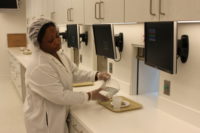Andy Hanacek, editor-in-chief of The National Provisioner, visited Hillshire Brands’ Chicago headquarters in November 2013 to speak with Jeff George, senior vice president of Research & Development, as well as Susan Zaripheh, Ph.D., director of Nutrition Research & Innovation, about a new study from Biofortis Clinical Research and the University of Missouri’s Department of Exercise Physiology and Nutrition (see the release on page 40). The study, which was funded by Hillshire Brands, provides good news for the industry in that it shows that adding a realistically attainable amount of protein (as little as 30 grams) to a breakfast meal allows for better satiety through the morning hours. This is the latest installment in a series of regular check-ins with the Hillshire team. What follows is the conversation between Hanacek, George and Zaripheh:
Hanacek: What’s different about this particular study in comparison to previous studies I’ve seen on protein-rich breakfasts helping curb appetite — is there a big difference or were there findings in this that were surprising by comparison to the other studies I’ve seen in recent years?
George: The results are different because very few of the studies have included a meat component. So, what this study tested was actually a commercially prepared product combination of meat and eggs. … The study had consumers [who ate] a high-protein bowl, or a moderate-protein bowl, or a serving of mini pancakes, syrup and butter; and then it had a “no breakfast” control. Calories are all about the same, and fat too, except for the no breakfast, obviously. Portion sizes were also controlled.
The variable was carbohydrates and proteins. … We asked consumers how hungry they were before they consumed the meal and then we started asking them every 30 minutes after, up to 4 hours, “How hungry are you?” Participants ate an unconstrained pasta lunch, and we measured how much they ate at the end.
Participants who consumed the protein variables at breakfast said that they were fuller between breakfast and lunch. And at lunch, they actually consumed fewer calories than not only the no-breakfast control group, but also the carb-heavy group.
Some of the breakfast studies conclude, “Eat your breakfast, because if you skip breakfast, you don’t perform as well.” We clearly showed that, but we also showed that calorie-controlled, meat protein versus carbohydrate offers advantages in satiety through to lunchtime.
Zaripheh: A lot of the studies that have been conducted might have used meat and sausage, but they typically do not use convenient, commercially prepared products. Someone cooks the sausage; someone cooks the egg in a laboratory setting. In this study, the breakfast was commercially prepared. Why that’s important from a health-and-wellness standpoint is, significant numbers of individuals in the U.S. skip breakfast, and one of the main reasons is because they don’t have enough time.
So, I think there are two benefits to this study. One, we can potentially help people consume breakfast with convenient, high-protein products. Two, we talk about weight management, sure, but there are other benefits of satiety having to do with busy moms, for example. It’s about those moms feeling like they can conquer their morning activities and not be thinking about their grumbling stomachs at a mid-morning meeting.
Hanacek: So Hillshire Brands feels particularly excited about this study because of its product offerings and the fact that the level of protein this study focused on is pretty easily attainable for the average consumer?
Zaripheh: The moderate-protein serving had 30 grams of protein and the high-protein serving had 39 grams of protein. This study shows that you don’t need to go above 30 grams of protein.
I think that’s really important to note, because the nutrition community and the research community has done research at [much higher levels] of protein at breakfast.
George: That’s a great point, Susan. The level of protein and the source of protein are easily [attainable]. It’s not this artificially boosted protein-shake contraption that people are forced to drink. These are realistic levels of protein delivered through commercially prepared foods.
Hanacek: In the results, was there any measurable, significant difference between the 30-gram and 39-gram servings of protein?
|
Get more of the story online Heather Leidy, an assistant professor at the University of Missouri, discusses a study she co-authored on protein-rich breakfasts and their effect on satiety, with Andy Hanacek, editor-in-chief of The National Provisioner. Get the exclusive Q&A with Andy Hanacek here: http://bit.ly/ProteinBreakfast2013 This podcast is online-only editorial content you can find only at ProvisionerOnline.com and on iTunes. |
Zaripheh: There was not a significant difference. And that was interesting and exciting for us, because it’s a good indicator for us to see what’s meaningful to the consumer and how can we maybe leverage that in the future.
George: The reason we included the 39-gram sample is, products aren’t available like this today, but what do we think ultimately could be viable? So let’s see if there’s an effect from that. Obviously, we’re thinking this could be a springboard to innovation as well. So, this insight around protein consumption in the morning is big.
Zaripheh: The USDA shows that people are getting more sugar at breakfast than protein. We think it’s really critical to help people eat more protein at breakfast, and it would just be beneficial for everyone.
Hanacek: So, you hinted at what this means innovation-wise. We’re all familiar with the Jimmy Dean messaging and the advertising that already promotes a protein-rich breakfast. So, how does this study change any of that messaging? How do you communicate this research out to consumers so they start to get it at a faster pace maybe than what they’re doing now?
George: This really supports the advertising we do today. So, if you think about the Jimmy Dean message, … it reinforces the satisfaction, the fillingness of protein, but also, the taste and eating experience of it. [Then], as we communicate this through [the media], through scientific/health professional conferences, through interviews that we have with health professionals, consumers are going to hear the message that, “Wow, breakfast is the most important meal of the day — I’ve known that my whole life. But maybe all breakfasts aren’t created equally, and maybe I need to think about the nature of my breakfast and get more protein.” For those many, many breakfast occasions that don’t include high levels of protein today, it gets consumers thinking about ways to introduce more protein in the diet.
We recognize, too, and are energized by the fact our protein breakfast is a growing category. … The exciting thing about doing research like this — especially third-party, externally-fielded, published in academic-type forums — the results are somewhat generalized. It helps us, but it helps the category, it helps the meat industry. So, we’re excited about not just doing research that we sponsor, but would consider it a call to action for the meat industry, that there’s a big opportunity to do more clinical research.
We think there’s so much potential to remind people that meat is a good source of protein. All the benefits you hear about Greek yogurt and other sources of protein, well, we can talk about that too.
Zaripheh: I think a call to action for the meat industry is really critical, because other industries, especially in the protein field, have been doing this for 20-plus years. It’s been good for consumers; it’s been good for their business.
And that’s where the meat industry comes in. The AMI has pulled together a nutrition group that’s focused on this, and we’re hoping other companies really come together to take this to the next level. … We can’t do it alone as Hillshire Brands, and we encourage those who want to get involved to contact Betsy Booren at AMI for more information (bbooren@meatami.com).
George: It needs to be a balanced conversation. We talked about it at Investor Day over a year ago, that there are a lot of headwinds in our category. A lot of times, those with differing points of view [on nutrition] than ours speak very loudly. We just want to make sure that the entire story is being told. I think it’s important for us to do that, not just as individual companies, but as a unified industry as well.
There is a positive story to tell here, and I think we are sometimes reluctant to tell the story or miss opportunities to do so, when it comes to the nutrition around meat.
Study: Protein-rich breakfast helps curb appetite
ATLANTA — (Nov. 14, 2013) New research presented today at The Obesity Society’s annual scientific meeting in Atlanta shows that eating high-protein sausage- and egg-based breakfasts curbed hunger throughout the morning, compared with a low-protein breakfast (pancakes and syrup) or skipping breakfast, in 18- to 55-year-old women.
“Eating a breakfast rich in protein significantly improves appetite control and may help women to avoid overeating later in the day,” said Kevin C. Maki, principal investigator of the study and a research scientist with Biofortis Clinical Research, a Mérieux NutriSciences company.
All of the breakfast meals contained approximately 300 calories and similar quantities of fat and fiber. The protein-rich breakfast bowls contained 30 to 39 grams of protein. Participants completed questionnaires to rate aspects of appetite — such as hunger, fullness and desire to eat — before breakfast and at 30-minute intervals between breakfast and lunch. A standard lunch meal of tortellini and sauce was served, and subjects were asked to eat until comfortably full.
Study participants had improved appetite ratings (lower hunger, more fullness, less desire to eat) throughout the morning after eating each protein-rich breakfast, and also ate fewer calories at lunch, compared with the low-protein breakfast and breakfast skipping (water only).
“In the USA, many people choose to skip breakfast or choose low-protein foods because of lack of high-protein, convenient choices,” said Heather Leidy, an assistant professor specializing in appetite regulation at the University of Missouri and a co-author on the study. “These results demonstrate that commercially prepared, convenient, protein-rich meals can help women feel full until lunchtime, and potentially avoid overeating and improve diet quality.”
The research titled, “Acute Satiety Effects of Sausage/Egg-based Convenience Breakfast Meals in Premenopausal Women,” was presented at the Obesity Society’s annual scientific meeting in Atlanta on Nov. 14, 2013. The study was a joint effort by Biofortis Clinical Research, Chicago, a division of Mérieux NutriSciences, and the University of Missouri’s Department of Exercise Physiology and Nutrition, Columbia, Mo. Funding for the research was provided by Hillshire Brands, Chicago.
Source: Hillshire Brands Co.












